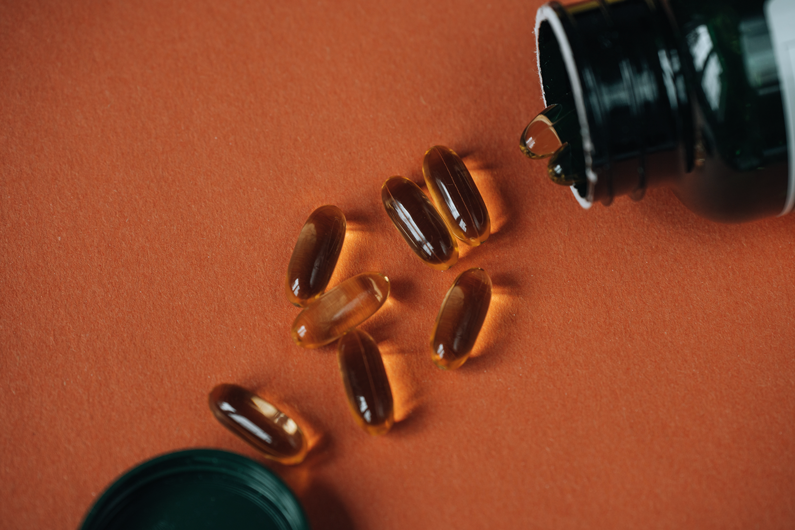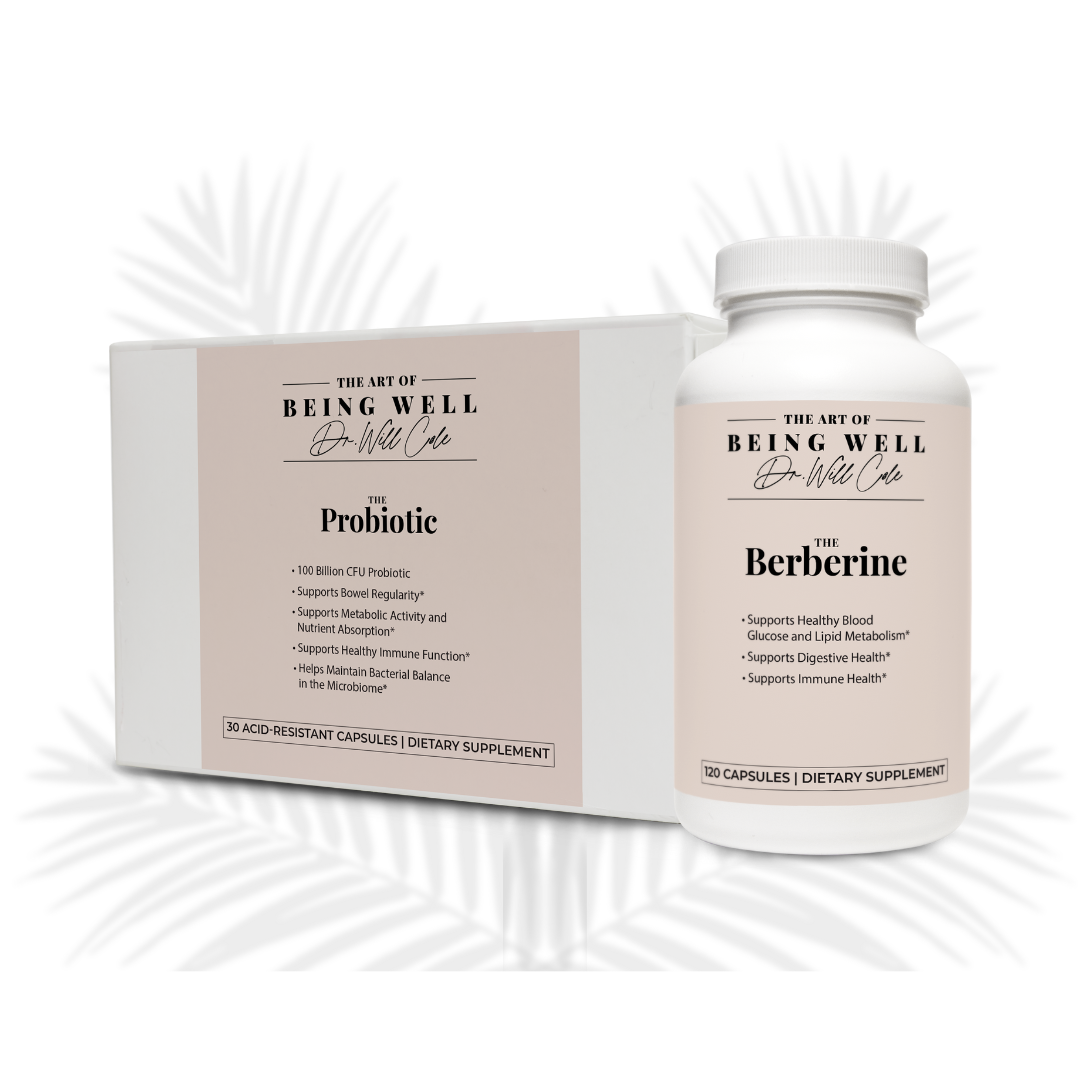Everything You Need To Know About The Different Types Of Probiotics

Whether you are new to the wellness world or have been around a while, you’ve probably heard a lot of talk around probiotics and gut health. As a functional medicine expert, probiotics are one the few supplements that I believe are beneficial for most people - regardless of your specific health case. However, it can get pretty confusing choosing which one to take from the endless variety on the market. And when you throw in terms like “soil-based” and “spore-based” it can leave you stuck in decision paralysis. So instead of adding to the confusion, it’s my job to demystify the differences between the various types of probiotics so you can make the best choice when it comes to your health.
What are probiotics and why are they important?
Your gut microbiome contains trillions of different microorganisms - bacteria, yeast, and fungi - that influence almost every aspect of your health from your weight to your immunity. In order to maintain a healthy microbiome, you want to ensure that your gut has a diverse range of different beneficial bacterial strains.
While these beneficial microorganisms are naturally present in our guts, there are many external factors that can disrupt the delicate balance of your microbiome (also known as bacterial dysbiosis) including stress, antibiotics, and poor dietary choices. Probiotics are supplements that contain strains of these beneficial microorganisms that work to either maintain a healthy balance of bacteria or replenish good bacteria to fight against any opportunistic overgrowths.
Types of probiotics
Unfortunately, choosing a probiotic is not as simple as going to your local vitamin shop. There are seemingly endless options for probiotic supplements depending on what you are looking for. In fact, there are actually a few different types of probiotics that each offer their own unique benefits. Here’s a breakdown of the types you’ll see most often. You may have even heard these terms tossed around before in various health and wellness podcasts, videos, and articles.
1. Traditional probiotics
Traditional probiotic supplements are formulated with live microorganisms - typically bacteria - that are often derived from fermented foods or specific strains that have been extensively studied for their positive impact on gut health. Some of the most common strains used in probiotic supplements include:
2. Soil-based probiotics
Soil-based probiotics contain microorganisms naturally found in soil, with many researchers believing that reintroducing these soil-based microbes into the human gut can contribute to a healthy and resilient microbiome by mimicking the ancestral exposure humans had to diverse soil microbes. Since they can also withstand harsh environmental conditions inside and outside of your gut, they are often chosen for their adaptability and don't typically require refrigeration. Common strains of soil-based probiotics include:
3. Spore-based
Unlike the live bacteria found in traditional probiotics, spore-based probiotics are bacterial spores – dormant, protective forms that allow them to withstand the harsh environmental conditions of your gut. These spores serve as a resilient shield, protecting the probiotic bacteria from heat, light, and the acidic environment of the stomach. Once in your gut, these spores activate, transforming into live, beneficial bacteria, making them a great option for people looking for more targeted, stable probiotic supplementation.
It’s important to note that while there is some overlap between spore-based and soil-based probiotics, as some spore-based probiotics can have soil origins, that doesn’t mean that all spore-based probiotics are derived from bacteria found in soil. Some of the most well researched strains of spore-forming probiotics include:
- Bacillus clausii (7)
- Bacillus coagulans
- Bacillus subtilis
What to look for when choosing a probiotic
Not all probiotics are created equal, and choosing the right one for you comes down to a few different factors that you must consider. Since there is no “one-size-fits-all” solution for everyone, it’s important to take these things into consideration to determine which probiotic is going to move the needle on your health the most.
1. Strain types
Different probiotic strains have specific benefits. For example, Lactobacillus acidophilus may be beneficial for those with lactose intolerance, while Bifidobacterium bifidum may support immune function. Understanding what specific strains do can help you match the one best suited for your particular symptoms. Still don’t know what to choose? A traditional probiotic that contains the strains Lactobacillus and Bifidobacterium is a safe bet as these strains have been extensively studied and are found (8) in most people’s guts.
2. Dosage
The effectiveness of probiotics often depends on the dose. Your doctor may recommend a higher dose to address a specific health problem, especially if you have underlying gut dysfunctions like SIBO, candida overgrowth, or leaky gut syndrome. Otherwise, a lower dose is often sufficient if you are looking to maintain an already healthy gut.
3. Delivery method
Probiotics are most often found in capsules. However, you can also find probiotics as liquid and powdered supplements. If you are dealing with certain health problems, these alternative forms can be easier on your gut and esophagus until you reach a point in your healing journey where you can tolerate capsules.
The takeaway
Everyone’s gut microbiome is unique. Not only do you have a specific combination of microorganisms that make up your microbiome, you also have many different factors such as diet, toxin exposure, and stress that influence the makeup of your microbiome for better or for worse. Therefore, it’s not a simple answer as to what type of probiotic is best for you. Working with a functional medicine practitioner can help you determine how to best incorporate probiotics into your health journey.
In my telehealth functional medicine clinic, we specialize in uncovering what is happening inside your gut with the most cutting-edge gut health labs. By identifying what is happening underneath the surface, we can recommend whether a traditional, soil-based, or spore-based probiotic is best for you (or a rotating combination of these) so you can finally achieve long-term, sustainable gut health.
As one of the first functional medicine telehealth clinics in the world, we provide webcam health consultations for people around the globe.
READ NEXT:
- A Guide To Starving Bad Gut Bacteria And Feeding The Good,
- A Healthy Oral Microbiome Is A Key To Better Health And Longevity
- The Top 12 Natural Antihistamines For Allergies
View More At Our Store
Purchase personally curated supplements
and Dr. Will Cole’s books!

- Gao, Huijuan et al. “The Functional Roles of Lactobacillus acidophilus in Different Physiological and Pathological Processes.” Journal of microbiology and biotechnology vol. 32,10 (2022): 1226-1233. doi:10.4014/jmb.2205.05041
- Chen, Jun et al. “Recent Development of Probiotic Bifidobacteria for Treating Human Diseases.” Frontiers in bioengineering and biotechnology vol. 9 770248. 22 Dec. 2021, doi:10.3389/fbioe.2021.770248
- Hill, Daragh et al. “The Lactobacillus casei Group: History and Health Related Applications.” Frontiers in microbiology vol. 9 2107. 10 Sep. 2018, doi:10.3389/fmicb.2018.02107
- Garvey, Sean M et al. “The probiotic Bacillus subtilis BS50 decreases gastrointestinal symptoms in healthy adults: a randomized, double-blind, placebo-controlled trial.” Gut microbes vol. 14,1 (2022): 2122668. doi:10.1080/19490976.2022.2122668
- A, Aysha Jebin, and Aparnna Suresh. “Oral microbial shift induced by probiotic Bacillus coagualans along with its clinical perspectives.” Journal of oral biology and craniofacial research vol. 13,3 (2023): 398-402. doi:10.1016/j.jobcr.2023.03.013
- Ramirez-Olea, Hugo et al. “Potential application of the probiotic Bacillus licheniformis as an adjuvant in the treatment of diseases in humans and animals: A systematic review.” Frontiers in microbiology vol. 13 993451. 26 Sep. 2022, doi:10.3389/fmicb.2022.993451
- Ghelardi, Emilia et al. “Current Progress and Future Perspectives on the Use of Bacillus clausii.” Microorganisms vol. 10,6 1246. 17 Jun. 2022, doi:10.3390/microorganisms10061246
- Mohajeri, M Hasan et al. “The role of the microbiome for human health: from basic science to clinical applications.” European journal of nutrition vol. 57,Suppl 1 (2018): 1-14. doi:10.1007/s00394-018-1703-4
The information on this website has not been evaluated by the Food & Drug Administration or any other medical body. We do not aim to diagnose, treat, cure or prevent any illness or disease. Information is shared for educational purposes only. You must consult your doctor before acting on any content on this website, especially if you are pregnant, nursing, taking medication, or have a medical condition.
Our content may include products that have been independently chosen and recommended by Dr. Will Cole and our editors. If you purchase something mentioned in this article, we may earn a small commission.

BY DR. WILL COLE
Dr. Will Cole, DNM, IFMCP, DC is a leading functional medicine expert who consults people around the globe, starting one of the first functional medicine telehealth centers in the world. Named one of the top 50 functional and integrative doctors in the nation, Dr. Will Cole provides a functional medicine approach for thyroid issues, autoimmune conditions, hormonal imbalances, digestive disorders, and brain problems. He is also the host of the popular The Art of Being Well podcast and the New York Times bestselling author of Intuitive Fasting, Ketotarian, Gut Feelings, and The Inflammation Spectrum.

Gut Feelings
Healing The Shame-Fueled Relationship
Between What You Eat And How You Feel



